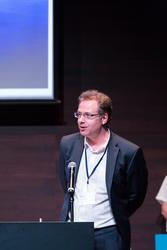 It is my distinct pleasure to present to you the inaugural issue of the University of Waterloo Water Institute’s new scientific newsletter – WaterResearch.
It is my distinct pleasure to present to you the inaugural issue of the University of Waterloo Water Institute’s new scientific newsletter – WaterResearch.
The Water Institute is one of the largest water research and education institutions in the world, with over 150 faculty members and 400 graduate students investigating a wide variety of complex water challenges. A key strength of the Water Institute is its ability to organize and conduct interdisciplinary research around complex water management issues – pushing the boundaries of water science, engineering, economics, and governance.
The Water Institute’s vision is to significantly advance the sustainable use and management of water for the benefit of the environment, the economy, and society. In realizing this vision and to increase the impact of our work, we believe that it is imperative to link our researchers and their research to end-users, including governments, the private sector, and civil society. WaterResearch has been designed to make that link, and to facilitate knowledge transfer and exchange with academics, practitioners, students, and other water-sector stakeholders interested in, and able to act on, innovative water research.
The Water Institute will publish WaterResearch three times per year, in the Fall, Winter and Spring academic terms. Issues will contain summaries of recently published articles that exemplify the interdisciplinary, cutting-edge research activities of our members. Issues will highlight research across the Institute’s five theme areas, focusing on Human Health and Well-being, Urban Water Systems, Watershed Management, Blue Economy, and the Global Water Cycle.
In this inaugural Fall 2017 issue, I invite you to explore a sample of our wide-ranging work, including professor Susan Elliott (Geography and Environmental Management) on the socio-cultural dimensions of water insecurity and sanitation practices; professor Mark Servos (Biology) on the response of fish to municipal wastewater treatment system upgrades; professor Peter Huck (Civil and Environmental Engineering) on selecting critical contaminants for monitoring in managed aquifer recharge systems; professor Nandita Basu (Earth and Environmental Sciences, Civil and Environmental Engineering) on how past nutrient legacies can impact current water quality; professor Roy Brouwer (Economics) on the role of water markets as a climate change adaptation tool in transboundary river basins; professor Marek Stastna (Applied Mathematics) on the influence of extreme weather events on the subterranean freshwater resources of Mexico’s Yucatan peninsula; and professor Jeremy Pittman (Planning) on governance across the land-sea interface.
We are excited to be sharing the Water Institute’s innovative and impactful science through WaterResearch, and I hope that you find our newsletter informative.
Professor Roy Brouwer
Executive Director
the Water Institute
University of Waterloo






